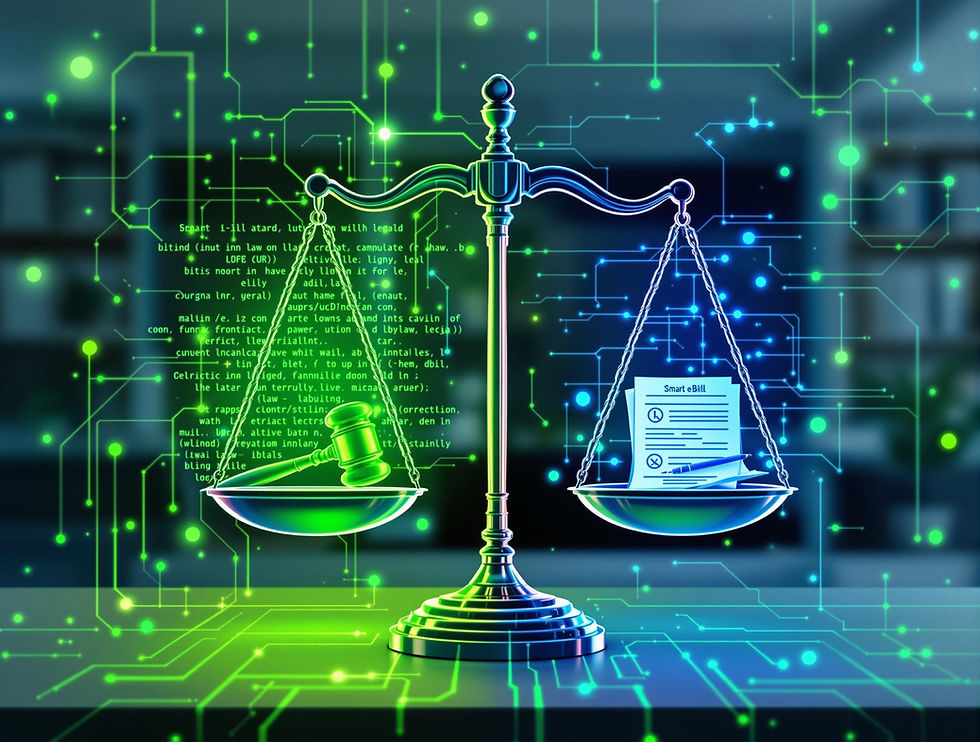The Future of Legal Billing: Embracing Automation and AI
- Inemesit Edet
- Jun 23, 2025
- 3 min read

Introduction
Legal billing is at the forefront of transformation in the legal tech sector. As client expectations rise and operational efficiency becomes a strategic imperative, law firms and legal departments are seeking smarter, technology-driven solutions. At Smart eBill Con, we’ve previously explored broad innovations in our post, “Technology Spotlight: The Innovations Reshaping Legal Billing (and Why They Matter Now)”. Today, we take a deeper dive into how automation and artificial intelligence (AI) are fundamentally redefining the future of legal billing.
Why Automation and AI N
ow?
Recent industry reports indicate that over half of legal professionals now use AI-driven tools for tasks such as document drafting and data analysis. This rapid adoption is driven by client demand for transparency, evolving compliance standards, and the necessity to reduce administrative overhead. While our previous Technology Spotlight highlighted the breadth of innovation, this article focuses on the pivotal role automation and AI play in billing transformation.
Key Innovations Revolutionizing Legal Billing
1. Intelligent Time Tracking and Capture
AI-powered platforms now automate time entry by passively monitoring work activities, ensuring billable hours are captured accurately with minimal manual intervention. This advancement not only reduces revenue leakage but also frees up attorneys to focus on substantive legal work.
2. Automated Invoice Generation and Compliance
Modern billing software leverages AI to produce invoices that adhere to client billing guidelines and regulatory requirements. By flagging potential issues before submission, these systems reduce rejections and accelerate payment cycles. For a broader discussion on the impact of these systems, see our Technology Spotlight post.
3. Predictive Analytics for Billing Optimization
AI-driven analytics tools evaluate historical billing data to forecast trends, identify inefficiencies, and recommend alternative fee arrangements. This empowers firms to offer more predictable pricing models, such as fixed or value-based fees, and to better align with client expectations.
4. Enhanced eBilling and Matter Management
Next-generation eBilling platforms integrate AI to automate compliance checks and streamline collaboration between firms and clients. This results in faster approvals, fewer disputes, and a more transparent billing process, expanding on the innovations we previously discussed in our blog.
5. Virtual Billing Assistants
AI-powered billing assistants and chatbots are now capable of answering billing queries in real time, providing matter updates, and sending proactive reminders. These tools reduce administrative friction for both lawyers and clients, furthering the efficiency gains highlighted in our earlier content.
The Competitive Edge
Firms that integrate automation and AI into their billing workflows are already outpacing their peers in efficiency, accuracy, and client service. As highlighted in our “Technology Spotlight,” the ability to focus on high-value legal work while delivering data-driven billing transparency is quickly becoming a differentiator in the legal market.
Challenges and Considerations
While the benefits of automation and AI are substantial, successful adoption requires careful attention to data privacy, change management, and continual professional development. Integration with existing systems and workflows is critical—something we’ve explored in our broader innovation coverage.
Conclusion
Legal billing has evolved from a back-office function to a core strategic asset. By embracing automation and AI, legal professionals can unlock new levels of efficiency, accuracy, and client satisfaction. For a comprehensive overview of adjacent innovations, revisit our Technology Spotlight.
Stay tuned for our next article: “Best Practices for Streamlining Law Firm Billing Processes.” For more insights, follow Smart eBill Con and visit www.smartebillcon.com.
.png)





Comments